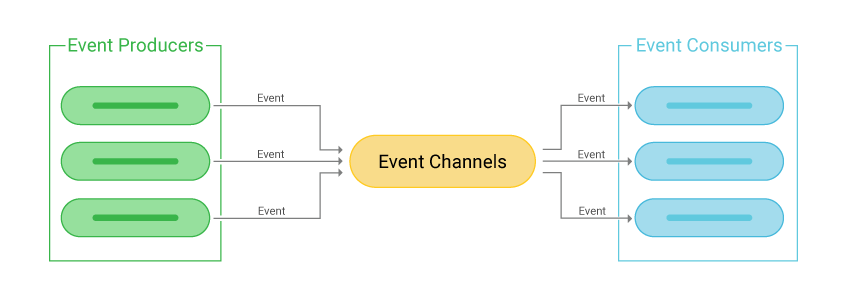...
Since menu type plugins are siblings in the DOMTree, it is not possible for menu type plugins to communicate with each other. Next to the menu type plugin, it is not possible to communicate from an editor type plugin to another editor type plugin or a menu type plugin.
| Info |
|---|
Example use-casecases An end-user selects 2 IED's in 1 plug-in. In order to make a connection between IED's, the user want to open the selection in an another plug-in. Based on specific edits, a vendor specific plug-in can add vendor specific functionality (e.g. Siemens) XSD validation errors |
Also, since addons are not extending from a HTMLElement, addons cannot subscribe to events themselves. HTML events are only going upwards in the DOMTree, not downwards and/or to siblings.
...
| Code Block | ||||||
|---|---|---|---|---|---|---|
| ||||||
export class EventBus implements EventTarget {
private _eventListeners: Map<string, EventListenerOrEventListenerObject[]>;
constructor() {
this._eventListeners = new Map<string, EventListenerOrEventListenerObject[]>();
}
addEventListener(type: string, callback: EventListenerOrEventListenerObject): void {
if (!this._eventListeners.has(type)) {
this._eventListeners.set(type, []);
}
this._eventListeners.get(type)!.push(callback);
}
dispatchEvent(event: Event): boolean {
if (this._eventListeners.has(event.type)) {
this._eventListeners
.get(event.type)
!.forEach((cb) =>
typeof cb === 'function' ? cb(event) : cb.handleEvent(event)
);
return true;
}
return false;
}
removeEventListener(type: string, callback: EventListenerOrEventListenerObject): void {
if (this._eventListeners.has(type)) {
this._eventListeners.set(type, this._eventListeners.get(type)!.filter((cb) => cb !== callback));
}
}
} |
| draw.io Diagram | ||||||||||||||||||||
|---|---|---|---|---|---|---|---|---|---|---|---|---|---|---|---|---|---|---|---|---|
|
Alternatives
Instead of the central EventBus, we can let plugins dispatch events on the plugin itself. If a plugin needs an event from another plugin, It can listen to an event being dispatched to Open-SCD Core .
...
It is possible to stop the event from bubbling further inside a plugin. This means that a plugin can negate an event that should be handled by a different plugin. (Plugin A sends an event (that should be read by Plugin B), Plugin C is listening to this event and stops the event from going further (event.preventDefault()). Because of Plugin C, plugin B never gets the event).
Alternative: Window object
Listen to the window object. This object is used everywhere in the OpenSCD application.
Pro's:
Con's
- Risk of becomming a distributored monolith: Distributed Monoliths vs. Microservices: Which Are You Building? | Scout APM Blog
- OpenSCD cannot run in an iframe
Consequences
Implementing a central event-bus means that current OSCD plugins need some refactoring to dispatch events to the event-bus instead of dispatching events on itself.
The semantic on the central procesbus are determined by the producer/consumer.
We can distinguish different type of events by Producer driven or Consumer driven.
Source: https://www.scylladb.com/glossary/event-driven-architecture/
For example, the oscd-open event is a Consumer driven event. The API of this event is established in OpenSCD Core and should be adhered by any plugin.
Producer driven events can be seen as notification events. The producer is notifying anyone who is interested in this event.
Code changes
| Code Block | ||||||
|---|---|---|---|---|---|---|
| ||||||
class MyPlugin extends HTMLElement {
onClick() {
this.dispatchEvent(new Event('oscd-click'));
}
} |
| Code Block | ||||||
|---|---|---|---|---|---|---|
| ||||||
class MyPlugin extends HTMLElement { eventBus: EventBus onClick() { this.eventBus.dispatchEvent(new Event('oscd-click')) } } |
